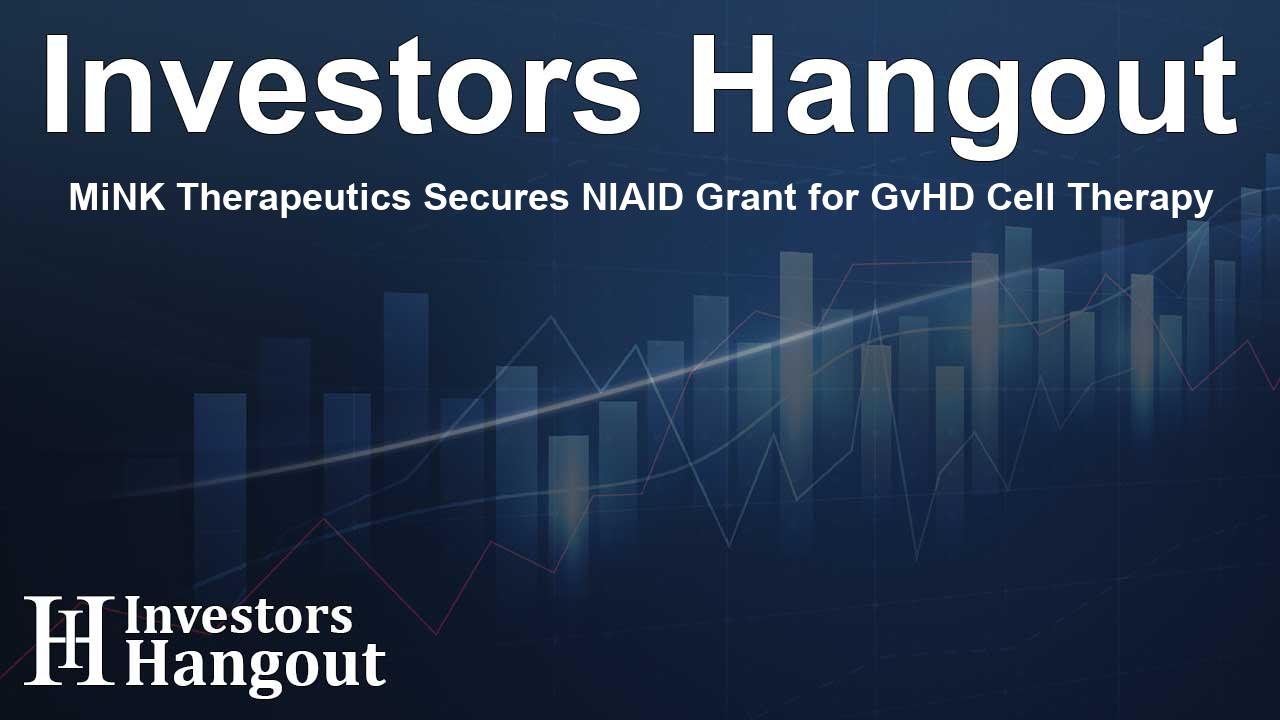MiNK Therapeutics Secures NIAID Grant for GvHD Cell Therapy

MiNK Therapeutics Receives Significant NIAID Grant
MiNK Therapeutics, Inc. (NASDAQ: INKT), an innovator in allogeneic invariant natural killer T (iNKT) cell therapies, has secured funding from the National Institute of Allergy and Infectious Diseases (NIAID). This prestigious grant is aimed at advancing the development of their allo-iNKT cell therapy platform, specifically designed for preventing and managing graft-versus-host disease (GvHD) in patients following hematopoietic stem cell transplantations. The collaboration with the University of Wisconsin marks a significant step towards addressing a critical medical need.
Understanding GvHD and iNKT Cells
Graft-versus-host disease is a serious complication that can arise after receiving a stem cell transplant, leading to severe multi-organ damage and increased mortality rates. The role of iNKT cells is paramount in this context, thanks to their unique properties that allow them to regulate immune responses, facilitate tissue repair, and diminish inflammation. MiNK's innovative approach offers a promising alternative to existing treatments.
Statements from Leadership
Dr. Jennifer Buell, President and CEO of MiNK Therapeutics, expressed her enthusiasm regarding the grant: "The non-dilutive funding from NIAID highlights the emerging acknowledgment of iNKT cells' powerful potential in immune regulation. The research led by Dr. Gumperz at the University of Wisconsin has shed light on how iNKT cells may not only curb GvHD but also enhance transplantation success. Through our collaborative efforts, we aspire to support the needs of nearly half of allogeneic transplant patients who face these serious health risks."
Collaboration with the University
Jenny E. Gumperz, PhD from the University of Wisconsin, emphasized the strength of their partnership: "Our collaboration fuses MiNK's advanced iNKT manufacturing capabilities with our profound knowledge in transplant immunology. iNKT cells can help temper the harmful immune responses associated with GvHD while still enabling the patient's immune system to combat infections, a delicate balance that traditional therapies often struggle to maintain. The backing from NIAID accelerates our journey toward clinical application, paving a safer path for transplant patients towards long-term recovery."
MiNK Therapeutics and its Innovative Mission
MiNK Therapeutics stands at the forefront of developing allogeneic iNKT cell therapies and tailored immune technologies. The company's proprietary platform aims to restore immune balance and enhance cytotoxic responses in treating cancer, immune-mediated disorders, and pulmonary issues. Among their lead developments is AGENT-797, an off-the-shelf iNKT cell therapy currently under clinical evaluation for GvHD, solid tumors, and severe pulmonary immune failure.
Advancing the Future of Immune Therapies
The innovative pipeline of MiNK includes T cell receptor (TCR)-based therapies and advanced neoantigen discovery methods, allowing precise immune activation. Their scalable, cryopreserved production method, alongside an adaptive mechanism bridging innate and adaptive immunity, showcases MiNK’s commitment to creating next-generation therapies that are not only effective but also broadly applicable.
Connecting with Investors and the Public
For further insights and continuous updates, investors are encouraged to check MiNK Therapeutics' official channels. The company is dedicated to maintaining transparency and providing vital information that could influence investment decisions.
Frequently Asked Questions
What is the purpose of the NIAID grant awarded to MiNK Therapeutics?
The grant supports the development of MiNK's allo-iNKT cell therapy platform aimed at preventing and treating graft-versus-host disease (GvHD) following stem cell transplants.
What is graft-versus-host disease (GvHD)?
GvHD is a serious condition that can occur when the immune cells from a donor attack the recipient's tissues after a stem cell transplant, potentially leading to severe damage.
How do iNKT cells contribute to immune regulation?
iNKT cells play a crucial role in regulating immune responses, promoting tissue repair, and suppressing inflammatory processes, which is essential in managing conditions like GvHD.
Who is involved in the collaboration for this project?
MiNK Therapeutics is collaborating with experts at the University of Wisconsin, particularly Dr. Jenny E. Gumperz, to advance the research and development of iNKT cell therapies.
What are the future goals of MiNK Therapeutics?
MiNK aims to develop effective and accessible immune therapies that address various health issues, while ensuring that their innovations broaden the range of applications in immune health.
About The Author
Contact Hannah Lewis privately here. Or send an email with ATTN: Hannah Lewis as the subject to contact@investorshangout.com.
About Investors Hangout
Investors Hangout is a leading online stock forum for financial discussion and learning, offering a wide range of free tools and resources. It draws in traders of all levels, who exchange market knowledge, investigate trading tactics, and keep an eye on industry developments in real time. Featuring financial articles, stock message boards, quotes, charts, company profiles, and live news updates. Through cooperative learning and a wealth of informational resources, it helps users from novices creating their first portfolios to experts honing their techniques. Join Investors Hangout today: https://investorshangout.com/
The content of this article is based on factual, publicly available information and does not represent legal, financial, or investment advice. Investors Hangout does not offer financial advice, and the author is not a licensed financial advisor. Consult a qualified advisor before making any financial or investment decisions based on this article. This article should not be considered advice to purchase, sell, or hold any securities or other investments. If any of the material provided here is inaccurate, please contact us for corrections.
